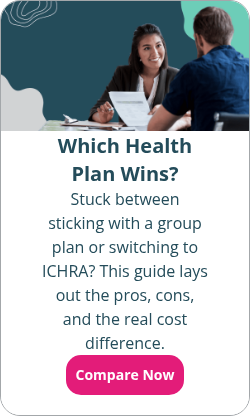Who is eligible for the individual coverage HRA (ICHRA)?
By Elizabeth Walker on October 4, 2024 at 8:00 AM
Group health insurance remains a popular employer-sponsored benefit in the United States. But traditional group health plans are too costly for many employers. Plus the one-size-fits-all nature of these policies may not meet every employee’s needs. That’s why more employers are turning to personalized benefits like health reimbursement arrangements (HRAs), which offer employers more budget control and employees more flexibility over their medical care.
One type of HRA is the individual coverage HRA (ICHRA). With this type of HRA, employers can reimburse employees tax-free for their individual health insurance premiums and other qualified out-of-pocket costs. But before you offer an ICHRA at your organization, you must understand its eligibility requirements.
This guide will cover everything you need to know about ICHRA eligibility criteria for employers and employees.
In this blog post, you’ll learn:
- The eligibility requirements for ICHRAs, including how employee classes work.
- How ICHRAs provide tax-free reimbursement for qualified expenses.
- If employees’ family members can take part in the ICHRA benefit.
What is the ICHRA?
The ICHRA is a formal, tax-advantaged health benefit. With an ICHRA, employers can reimburse their staff tax-free for individual health insurance premiums and qualified out-of-pocket expenses.
Eligible expenses include:
- Prescription drugs
- Emergency care
- Physical therapy
- Preventive services
- And much more
ICHRAs are more customizable, budget-friendly, and flexible than traditional group plans. They have no minimum or maximum employer contribution limits. Employers can offer their staff as much allowance as their budget allows. They also have no minimum participation requirements or annual rate hikes. This makes them a better option for business owners in the long run.
The following is a brief explanation of how the ICHRA works:
- You set your monthly allowance. You decide how much tax-free money to give your staff to spend on healthcare. Only employers can fund an HRA. But, all unused contributed funds stay with you at the end of the plan year or if an employee leaves your company.
- Your employees enroll in eligible health insurance plans. Employees need a qualifying individual health plan to participate. We’ll discuss the details of this below.
- Your employees buy healthcare. Your employees buy their medical expenses upfront and out-of-pocket. IRS Publication 5021 and the CARES Act2 have complete lists of qualified items and services. But, you can limit your benefit to just cover individual insurance premiums in your ICHRA plan documents.
- Your employees submit proof of purchase. After buying an eligible service or item, your staff shows you documentation of the expense. Acceptable documentation is typically a receipt or invoice. If you use PeopleKeep’s ICHRA administration software, our team will examine and store the documents for you.
- You approve and reimburse the medical expenses. After reviewing the document to ensure it complies with IRS regulations and the terms of your benefit, you approve it. Then, you reimburse your employees tax-free up to their allowance amount. Reimbursements are free of payroll taxes for employers and income-tax-free for employees.
ICHRAs are an attractive option for employers—and they’re rising in popularity. According to an HRA Council report, the number of business owners who have chosen an ICHRA grew 29% between 2023 and 20243.
With this benefit, you’ll avoid the complex administrative responsibilities that come with traditional group health insurance. It also lets your eligible employees decide how best to use their benefit, giving them more control over their medical care.
What types of businesses are eligible to offer the ICHRA?
The ICHRA is for organizations of all sizes that have at least one W-2 employee. It can scale with your business as it grows over time, allowing you to invite new employees when they join your workforce.
The ICHRA is particularly helpful for applicable large employers (ALEs). ALEs are organizations with 50 or more full-time equivalent employees (FTEs). The federal government requires these organizations to offer health insurance under the employer mandate. The ICHRA gives these employers an alternative to a traditional group health plan.
To meet the mandate, the employer’s ICHRA must be affordable. Employees must also use their ICHRA allowance toward an individual health plan that provides minimum essential coverage (MEC) and minimum value.
You can also offer group health insurance and the ICHRA at the same time. But you can’t offer group health insurance and the ICHRA to employees of the same class.
For instance, you could offer a group plan to your full-time staff and the ICHRA to your part-time workers. But you can’t give your full-time employees the choice between a group health plan and the ICHRA.
Which employees are eligible to participate in the ICHRA?
The ICHRA can only cover W-2 employees. Business owners are eligible for the benefit if the IRS considers them employees. But your W-2 workers must also have a qualifying form of individual health insurance coverage to take part in the benefit.
The following are eligible plans under an ICHRA:
- Qualified individual plans from a public health exchange. Public exchanges are the federal Health Insurance Marketplace or a state-based marketplace.
- Individual policies from a private exchange, like an insurance company, broker, or licensed agent. Private exchange policies only qualify if they provide MEC.
- Medicare Parts A and B together
- Medicare Part C, also known as Medicare Advantage plans
- Student health insurance plans, except for self-insured student health coverage
- Catastrophic plans for those younger than 30 or who have a hardship exemption
Uninsured employees and those with traditional group coverage, such as a spouse’s or parent’s plan, can’t use an ICHRA.
Other ineligible coverage options include:
- COBRA
- TRICARE
- Healthcare sharing ministries
- Association health plans
- Short-term medical plans
- Fixed indemnity plans
- Medicaid
If your employees don’t have an eligible plan, they can switch to one once you offer them an ICHRA. That’s because offering your eligible employees the benefit triggers a special enrollment period. This means your staff can enroll in a qualified health plan on the individual market within 60 days of you offering them the benefit.
If you offer an ICHRA through PeopleKeep, we make this process simple. Your employees can enroll in a health plan right from their PeopleKeep account.
Can employees’ families participate in the ICHRA?
Employees’ legal spouses and dependents can participate in the ICHRA if they have proper health coverage. This coverage most often comes from the employee’s individual health insurance plan.
But family members aren’t automatically eligible even if they have proper coverage. The employer must extend eligibility to spouses and dependents in the ICHRA plan documents for them to receive reimbursements.
If the employee or family member loses qualified coverage, they can’t keep receiving reimbursements through the ICHRA.
Can employers vary eligibility by employee classes?
With the ICHRA, employers can vary eligibility and allowances based on 11 job-based employee classes. These classes allow you to better customize the benefit. This is especially important if you’re targeting specific groups of workers to improve hiring and retention.
The chart below explains each class of employees in more detail.
|
Employee class |
Description |
|
Full-time employees |
You can define full-time status as anyone who works 30 hours or more per week or 40 hours or more each week. To meet employer mandate regulations, you must consider full-time as anyone who averages at least 30 hours of work per week. |
|
Part-time employees |
You can define part-time status as anyone who works an average of less than 40 hours per week or an average of less than 30 hours per week. |
|
Seasonal employees |
These are employees that you hire to work short-term. |
|
Temporary employees of staffing agencies |
These employees provide temporary services for a company. But the staffing firm employs them, not the company. |
|
Salaried employees |
You pay salaried employees a fixed amount of money regularly, regardless of how many hours they work. |
|
Hourly employees |
Hourly workers receive a predetermined wage for the exact time they work each pay period. |
|
Employees who have a collective bargaining agreement |
These types of employees have a written agreement between your company and their union. The agreement outlines the conditions of employment, pay rate, work hours, and other job details. |
|
Employees in a waiting period |
These are employees who must wait to become eligible for the ICHRA. You can choose a waiting period of up to 90 days. |
|
Foreign employees who work abroad |
These employees work outside the U.S.4 According to the federal government, these employees are nonresident aliens with no U.S.-based income. |
|
Employees who work in different geographic locations |
You can create a class based on insurance rating areas, states, or multi-state regions. These employees live outside your company’s physical geographic rating area5. |
|
A combination of two or more of the above |
You can combine two or more of the above classes to create custom categories. |
If you’re managing your ICHRA with PeopleKeep, you can only vary eligibility with these classes:
- Full-time
- Part-time
- Seasonal
- Salaried
- Non-salaried
- State-based
- A combination of the above
Conclusion
With an individual coverage health reimbursement arrangement (ICHRA), employers of all sizes with at least one W-2 employee can access a cost-saving and flexible health benefit. As long as your active employees have qualified individual health insurance coverage, they can participate in the benefit and receive tax-free reimbursements for their monthly premiums and other healthcare costs.
If you’re looking to ditch your group plan, satisfy the employer mandate, or simply offer a personalized benefit, PeopleKeep can help. Out HRA administration software can help you design and manage your benefit in minutes each month. Book a call with one of our HRA specialists today to learn more about the ICHRA.
This article was originally published on February 26, 2019. It was last updated on October 4, 2024.
Check out more resources
See these related articles

15 individual coverage HRA (ICHRA) FAQs
If you’re new to ICHRAs, don’t worry! This blog answers 15 FAQs employers have about ICHRAs to help you understand how it can benefit your employees.

How does ICHRA affect CHIP eligibility?
Learn how an ICHRA offer can impact CHIP eligibility for employees’ children. Understand coordination of benefits and income considerations.

How the ICHRA is changing healthcare
Learn how the ICHRA is transforming healthcare by offering flexible, personalized health benefits for businesses and employees alike.



